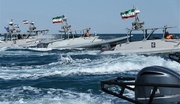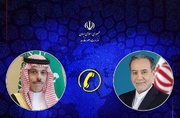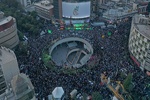31 years ago, Cyprus was divided. As the third largest Island of Mediterranean basin in southwest of Asia and east of the Mediterranean Sea, Cyprus was conquered by Ottoman empire in 1571. In 1878, Ottoman Empire, crushed by Russia, leased the island for Britain for only 92,000 gold sterling coins to secure her support against Russia. During the First World War, Ottoman Turkey was an alley of Germany, thus fighting Britain; so, Britain declared annexation of Cyprus, appointing a governor there. In 1960, Cyprus gained independence from Britain as Republic of Cyprus, where Turk and Greek communities had similar rights.
The conflict was compounded in Cyprus when president of the island Makarios waged an attempt to amend the 13th article of the constitution, while some of the articles were inviolate. With the escalation of the hostilities, civil war broke out in the island in December 21, 1963, culminating in 1967 entering of Greece army of 15,000 forces to the island. With a coup d'état in Greece of 1974, the military nationalist government exercised stricter measures on Cyprus, and with overtaking the parliament in July 15, they appointed a puppet president to power.
Turkey did not remain silent and, according to Article 4 of the Zurich and London accords, dispatched armed forces in July 20. In July 22, Turkish forces entered Lefkoşa (Nicosia); however international pressures brought their progress to a halt. In November 15, 1983, Northern Cyprus Republic declared existance, and the arrangement for union has yet come to nothing.
In the occasion of 31st anniversary of the island’s division, and with recent discoveries of oil and gas reservoirs in the island waters, Mehr News Turkish service interviewed Canan Onurer, political analyst and journalist, and editor-in-chief of Kıbrıs Postası (Cyprus Post) daily about Turkish policies on Cyprus.
Cyprus enjoys historical and geopolitical importance. Under ancient Greek, Roman, and in later times under Ottoman empires, it has retained the place and importance. Historically viewed, the events of 1963 and the conflict between Greeks and Turks and of 1974 Turkish military intervention in the island and the events ensued are crucial in the development of the status quo in the island and eastern Mediterranean Sea.
Why a small island as Cyprus is highly important has roots in many factors, inter alia, that Cyprus is an Asian country, while located in the Mediterranean Sea, and historically and culturally, falling under the cultural influence of Europe. It is a small island with rich historical and natural heritage. Recently, oil and gas reservoirs discovery has added to already strategic place of the island, and its traditionally rival neighbors have detected the gem.
In 2004, a referendum by the UN was held to measure public vote for the Road Map prepared by the Secretary General Kofi Annan. In 2003, borders between northern and southern Cyprus opened and now Cypriots cross these border stations to frequent between north and south. Talks for unification of two sides even before Northern Cyprus declared existence in 1983 have yet brought nothing tangible under UN supervision, mainly due to foreign interventions.
Mehr News asked Mrs. Onurer about the future of peace talks between northern and southern Cyprus after Kofi Annan’s roadmap failed to produce anything special. “In 2003 referendum, 75 per cent of Turks voted yes while 65 per cent of people with majority of Greeks voted Nay to the roadmap, which was quite disappointing for both sides, since Turkish intervention in 1974 won for Northern Cyprus only international sanctions and only Turkish recognition as independent state,” she said.
“Any unrest in Cyprus, either north or south, is not for the interest of Asia and Europe, and would send shockwaves to the whole region; the situation in Cyprus should be viewed in a more positive light, since any conflict in the island and eastern Mediterranean would deteriorate the political climate already in turmoil with the rise of ISIL in Syria and Iraq,” adds Onurer. “Oil and gas has been source of not peace and stability but bloodshed in any spot across the world,” she believed.
“According to scenario directed by the hegemonic powers for controlling energy resources, they could not guarantee the real demands of people in north and south of Cyprus; time has come for Cypriots, Turkey and the Middle East to understand that oil, gas, or any other natural resource would not bring friendship and peaceful symbiosis; they should sit themselves in a friendly session,” Onurer emphasized. “Time has come for Turkey and Greece to cast the old historic straightjacket of ethnic hatred in the political arena,” she called both sides.
In response to a question on Recep Tayyip Erdoğan and the Justice and Development Party policies on the Cypriot issue, Onurer told Mehr News that all Turkish political parties except Republican People's Party had not taken into consideration the interests of the local people of island; “Erdoğan’s party seeks realization of their own objectives in the European Union and exploits Cyprus as a trump card and a political hostage,” she said. “Turkey uses Cyprus as a weapon against EU; occasionally, Turkey sees Cyprus as a barrier in its path to more constructive relations with the EU, since the issue has closed windows for Turkey to join the EU,” Onurer emphasized.
Interview by: Omid Shamizi
SH
MNA
END


























Your Comment